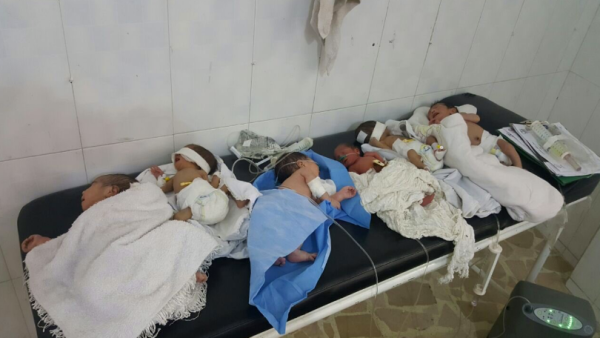PHOTO: Babies in the basement of an east Aleppo hospital amid Russian-regime airstrikes, June 2016
Bahira al-Zarier and Justin Schuster write for Syria Direct:
When Miriam al-Zain, 38, gave birth to her daughter Rahaf in April, she was unable to properly breastfeed.
“I got a medical exam, which showed that I could produce milk, but the amount was far less than with my previous two children,” a-Zain tells Syria Direct.
Al-Zain breastfed her two older children — now six and three years old — without any issues, but that was before the Assad regime’s advance this summer on rebel-held east Aleppo city.
“Because of the bombings—because of the fear that we face on a daily basis in Aleppo — my milk dried up,” says a-Zain. To make up for the shortage, al-Zain began raising her six-month-old daughter on baby formula, as are roughly 60% of infants across Syria.
Local charities once distributed cans of formula for free, but since the city’s September encirclement, almost nothing has entered Aleppo. Even longstanding black market smuggling routes have closed under the pressure of the airtight siege, sources in east Aleppo tell Syria Direct.
“The city is down to its final 5,000 cans of formula,” Ali Sheikh Omar, president of the Aleppo Relief Commission told Syria Direct. “That’s hardly enough to cover a quarter of the city’s children and for one month at most.” The Aleppo Relief Commission is partner with the Aleppo Local Council and is responsible for the distribution of food and medical aid in rebel-held east Aleppo city.
“I Wish I Hadn’t Given Birth”
“Mothers are fighting to stave off starvation because of the siege, which has led to a rise in an inability to breastfeed,” said Dr. Hussam al-Ali. “But these alternatives that mothers are turning to can lead to severe malnutrition and digestive health concerns for infants.”
Last week, an Aleppo child reportedly died due to severe malnutrition in the absence of baby formula, sources in east Aleppo tell Syria Direct, adding that residents fear a sharp increase in such cases as the siege drags into its fifth week.
The World Health Organization maintains that breastfeeding is still a viable option, even in active warzones.
“We must quash the common misconception that mothers cannot breastfeed adequately in stressful settings or if they have poor nutrition,” WHO’s Director of Nutrition for Health and Development Francesco Branca and UNICEF’s Chief of Nutrition Werner Schultink, wrote in a WHO statement in May.
But for thousands of mothers in besieged Aleppo, breastfeeding is no longer a viable option, whether due to the trauma of war or an earlier decision to feed their newborns baby formula when it was still available.
“It’s heartbreaking to say…but I wish that I hadn’t given birth to Rahaf in the midst of this war,” al-Zain told Syria Direct. “Death is everywhere here, in all of its streets.”
Every day, al-Zain says, “I feel tremendous sadness; whether it’s from the bombing or from the hunger, I’m terrified that my daughter could die any day.”

